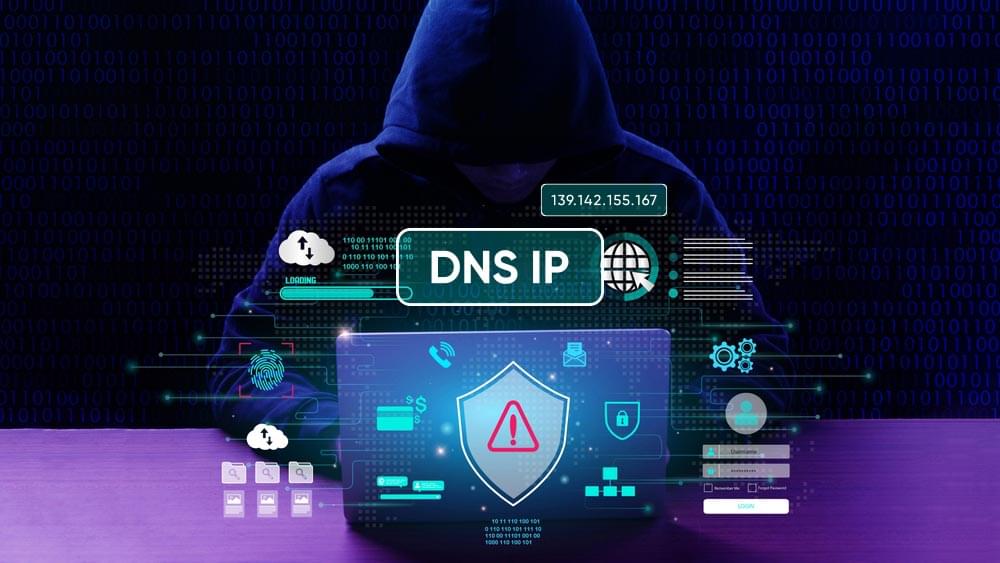What can someone do with your IP address?
In this digital era where people are connected via the internet and spend most of their time online, all the gadgets involved in online activities can reveal sensitive information like our IP address. Even though an IP address looks like an ordinary set of numbers, it can be very dangerous if it gets into the wrong hands. There are many cases where cyber criminals use this kind of information to attack and violate someone’s privacy and threaten them. In this article will explain the reasons why one should be worried about having their IP address exposed and what measures need to be taken in order to protect their IP address.
How do IP addresses work?
An Internet Protocol address is a designated number that determines the exact location of a machine that is connected to a network and communicates via the Internet Protocol. It usually consists of four numbers that fall within the range of 0-255 and are separated with dots, for example an address can be written as 192.168.1.100. The two common types of these IP addresses include the IPv4 and the IPv6. Most internet users still utilize IPv4 addresses but there is a slow movement towards usage of IPv6 addresses due to the increasing number of internet-enabled devices.
On the other hand, internet service providers (ISP) are responsible for providing the assigned IP addresses to those devices and accessories, computers, smartphones, routers, etc, that are connected to the internet. They can also be dynamic which means that they are generated every time a person logs onto the internet or static in which case they do not change for a particular gadget or network.
How can someone find your IP address?
Your IP address can be unveiled in a number of ways:
- Website visits: It is noted that when a user accesses a website, the web server takes the IP address of that user and keeps it on record for the website’s traffic logs.
- Social media platforms: Social media platforms also track the IP addresses of a person using it for paid personalized advertisements and to serve the accounts better.
- File sharing: P2P file-sharing networks allow your IP address to be accessed by others who are also sharing the same network.
- Online forms and registrations: Simply completing a form on a website or answering a survey, or subscribing to a service can disclose to the website your IP address.
- Online games: Usually, IP addresses are revealed in multiplayer online games to create a direct connection of a player with the participants.
- Malicious advertisements and links: Cyber criminals can post fraudulent advertisements or links with the intent of obtaining your IP address when clicked.
- Public Wi-Fi networks: Using free public Wi-Fi can also result in exposing your IP address to other people as well connected to that same network space.
What can someone do if they have your IP address?
Even though an IP address alone might not hold sensitive personal information, it can be a good starting point for many malicious individuals to hack your system. Some of the possible risks that you can face if someone has your IP address:
Locational tracking
Although your IP address cannot locate the exact physical location, it can still track a general area where you are based, for example, a region or a city. And that’s exactly what will be taken advantage of by criminals to carry out smart attacks or execute physical crimes of perhaps stalking or burglary.
Inferring individuals’ online activities
If someone has your IP address, that person can monitor your online activities and can spay on you which sites you visit and what services you are availing online. This information can be exploited for targeted ads, blackmailing, and other bad uses.
Distribution denial of service (DDoS) attack
If hackers have your IP address, they can perform a DDoS attack on your device or network by sending more traffic to your device than it can handle. This makes your device unresponsive or slow. These attacks are often used to ask the victim for ransom money or to destroy someone’s essential data.

Identity theft and impersonation
An IP address by itself does not necessarily cause identity theft but when used together with other information that might have been acquired through phishing or social engineering, the former could pose a real threat. You may find fake profiles created in your name, and these fake profiles may be involved in some unlawful activities or posting and sharing of harmful content. Cyber criminals can also use your information to commit big fraud, which can cause serious issues.
Device hacking and malware infections
If an attacker gets hold of your IP address and also finds loopholes in your network or device, then he or she will attempt to breach into your system and implant a virus. This situation prevents data integrity, results in leaks and unauthorized access to personal and other sensitive data, and even the hacker can fully control your device.
Social media accounts hacking
Sometimes, the IP address of an online service or platform may be entitled to an extra layer of security verification. Once the cyber criminal has your IP address they may try to intrude into the accounts through IP spoofing or IP address forging, which can cause serious issues.
Targeted advertising and spam
Online advertisers and spammers may use your IP address when sending targeted advertisements and pop-ups that are based on your past activities and, in some cases, approximate location. While this is not so dangerous at the outset, especially when conducted on a limited scale, it is still an invasion of privacy and a potential first step towards more serious attacks.
IP blocklisting and service restrictions
Some online services or platforms may limit accessibility due to geo-restrictions according to specific IP addresses. If your IP address relates to any other negative activities, you will be locked out of access to some of the services and contents online.
Selling the IP addresses on the dark web
Often, cyber criminals can sell or barter out your IP address on the dark web to anyone who may want to perform different attacks or even cyber crimes using your IP address as the entry point. This can frame you for a severe crime, which can cause some serious legal actions against you.
How to protect your IP address?
While the risks associated with someone obtaining your IP address are significant, but there are some best practices you can implement to safeguard your online privacy and security:
Use a VPN
VPN is one of the most secure ways of safeguarding one’s IP address and overall network connection. When connected to a VPN server, your internet connection is encrypted and channeled through another network and your IP address is concealed and replaced with that of the VPN server. EonVPN is a leading VPN service provider that uses a high level of encryption, a no-logs policy and a wide variety of server choices to protect your anonymity online. It can also protect you from many hacking activities.
Update your firewall and router
Periodically upgrading your firewall and router software is very important in order to eliminate or prevent the exploits of any known weaknesses that hackers may be eyeing to take advantage of. It is always recommended to install new security patches for your devices and the latest firmware which can dramatically improve your overall online security.
Adjust privacy settings
There are privacy controls available with most internet services and applications that can be used to control the amount of personal data disclosed. Check and modify these settings to minimize the exposure of your IP address and other identifiable data.
Disable WebRTC
Web Real-Time Communication (WebRTC) refers to a technology that makes it possible for real-time direct communication between browsers and applications. But it can still reveal your IP address even if you’re using a VPN, which is quite risky. To prevent such IP address leakage, you can consider turning off WebRTC in your browser settings or using WebRTC-blocking browser extensions.
Be careful when disclosing personal details
It is recommended to avoid posting or discussing personal information in web forums, social networks, or other websites with a low level of security. Do not click on any link or ad that is questionable, as they may be rigged to get your IP address or may download a virus into your system.
Used secure connections and encryption
It is recommended to open secure connections such as HTTPS and encrypt data when it is necessary to access important information or transfer information through the World Wide Web. This can assist in ensuring that your IP address, amongst other information, does not get accessed and utilized by unauthorized individuals.
Change your IP address
In case you find that your IP address has been disclosed or hacked, you can change it by resetting your router or reaching out to your ISP. This can be useful in minimizing further risks that can be associated with the IP address and other related problems of exploitation.
Use a proxy server
A proxy server can function as an intermediary between your device and the internet so as not to expose your actual IP address to the respective sites and services. It is essential to be careful while choosing a proxy server, always go for the reputable proxy server.
Enable browser privacy settings
The majority of web browsers have privacy settings that can aid in obscuring your IP address, including incognito and private browsing.
Use the most suitable method mentioned above to hide your IP address from cyber criminals.
Conclusion
Your IP address is crucial when it comes to the use of the internet, but it can also pose a weakness if exploited by others. Therefore, whenever you are using a Wi-Fi connection, it is recommended to take precautions and minimize exposure to risks and threats that are out there in this digital world to avoid any mishaps. Alas, it is crucial to understand that being cautious and using the correct approach to protecting your digital identity is all that is needed to stay safe.
It is essential to recognize that security is a continuous process, and therefore it is imperative to remain up-to-date with new developments within the threat landscape. It is, therefore important to avoid this exposure and learn how to work with IPs in the best way that ensures one is safe from the risks involved on the internet.
FAQs
Can someone use my IP address to control my computer remotely?
No, it’s impossible to control your computer directly by just knowing your IP address. However, if your network or devices have security vulnerabilities (like open ports or weak passwords), an attacker will probably attempt to penetrate with the help of vulnerabilities. Firewalls and updated software are important when it comes to protection of your devices or networks.
Can everyone see my IP address?
No, not everyone can see your IP address. Your IP address is only visible to the websites you visit, using online services, and others on the same local network. However, your IP is not exposed to other people out there unless you disclose it or you are using the internet in a cyber café or any other place where the internet is shared.
Is it legal to trace an IP address?
Yes, it is legal to some extent to track an IP address to figure out the approximate location or the ISP. However, utilization of this information for criminal, stalking, or unauthorized observation purposes is prohibited. Legal authorities can track IPs while conducting investigations; however, ordinary users need to follow the laws concerning privacy.
Can my employer see my IP address?
Yes, your employer can see your IP address depending on circumstances, such as if you are connected to their network or using company-issued equipment. Employee activities are often tracked, including IP addresses, for some purposes like security, efficiency, and legal requirements in many organizations.
Can I change my IP address?
Yes, it is possible to change the IP address by resetting the router or by contacting the Internet Service Provider. This can be helpful if you believe your IP address is compromised or shared with bad players in the field.
Do I need to worry about my IP address if I use a VPN?
When you connect to a VPN such as EonVPN, your actual IP address is hidden, and your traffic passes through the VPN server IP address. This greatly minimizes the likelihood of someone obtaining your IP address because you are using a VPN server’s IP address, and your actual IP is hidden.

